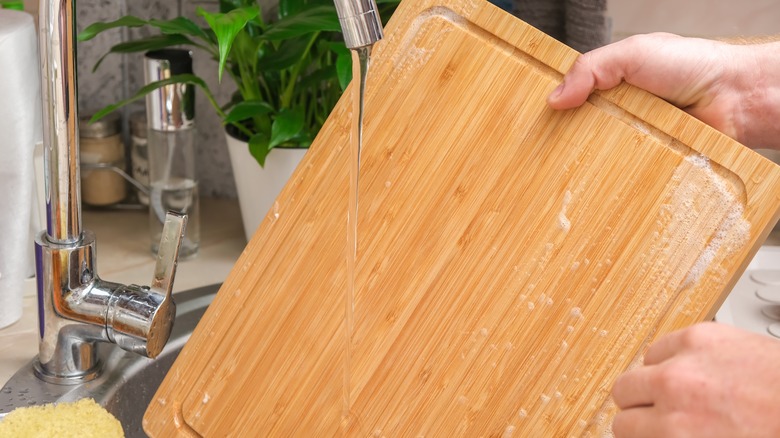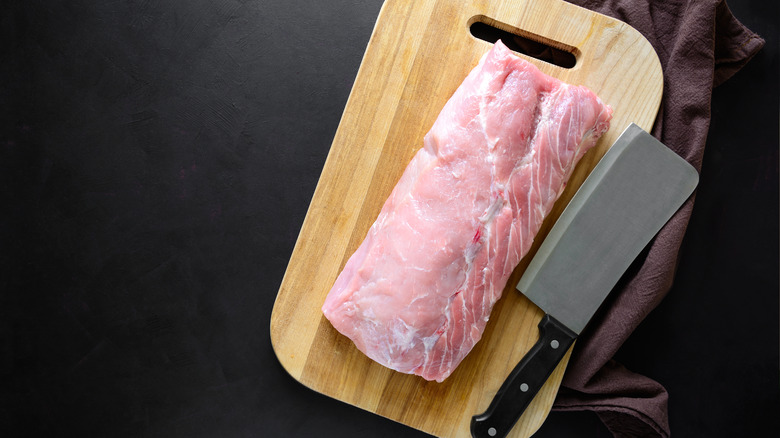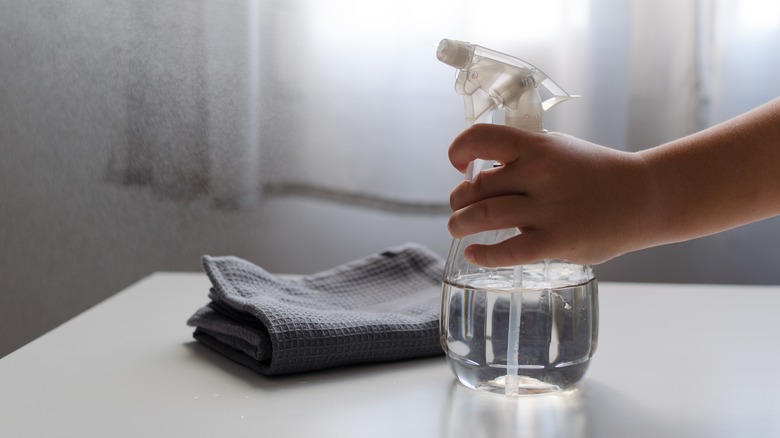Here's Why Vinegar Is The Perfect Choice To Deodorize Your Cutting Boards
We may receive a commission on purchases made from links.
Cutting boards are an essential tool in a kitchen, but they can also harbor leftover food particles and unbecoming scents. As a result, they require a bit of extra cleaning since a simple wipe with a sponge may not always be effective in removing substances or odors. Worn-out cutting boards with cuts and grooves in them are more likely to harbor pockets of food and odor since they may be difficult to properly clean. Incidentally, that is also a sign that you may need a new cutting board. Sometimes, cutting boards require a bit more help to remove pungent scents that have been cut into the surface, which is especially true with wooden cutting boards.
Thankfully, vinegar is a natural solution that can be used to banish odors; leaving a cup of vinegar on your kitchen counter can help a smelly kitchen, and vinegar can also be used to clean utensils after whipping up a strong-smelling dish, such as fish. "If the fishy smell clings to the pan and utensils that you have cooked the fish with, wash them with water and vinegar," Leanne Stapf, COO of The Cleaning Authority, told AARP.
Vinegar will also help your cutting board smell fresh. To properly care for your cutting board, you should always do a little preemptive deodorization after each use. To prevent leftover odors from remaining, it's important to regularly sanitize cutting boards, and dry them thoroughly after washing. Store them in a cool, dry place to help prevent the growth of harmful bacteria. However, if you still smell leftover odors, you can reach for some vinegar.
Benefits of using vinegar to clean cutting board
Vinegar can help keep your house clean and using it on your cutting board has a few key benefits. It won't damage or discolor your cutting board like harsh chemicals can. Vinegar is also cost-effective (a gallon of distilled white vinegar will cost you just $3.74 at Wal-Mart), making it a great alternative to expensive deodorizing products.
Though it is sometimes used as a natural disinfectant to kill bacteria and viruses, as per Healthline, it's not considered an official disinfectant by the Environmental Protection Agency. For the EPA to recognize a substance as a disinfectant, it must kill 99.9% of bacteria and viruses that cause disease, including viruses such as COVID-19. The acetic acid in vinegar can help kill some E. coli, salmonella, and listeria, germs often found on cutting boards that cause foodborne illnesses. However, a study published in Infection Control and Hospital Epidemiology found that, although vinegar kills some bacteria, commercial cleaners are more effective. Also, many times vinegar is diluted with water when used to clean, and that can make its germ-killing capabilities less effective or ineffective.
Still, vinegar is a great way tool to use on cutting boards to help remove stubborn stains and odors. Many times we cut up strong-smelling foods on cutting boards that can get trapped in the board's surface. Onions and garlic can be some of the worst offenders. Vinegar is a natural deodorizer since the acetic acid in it naturally bonds with the offending odor molecules to leave your cutting board smelling fresh and clean.
How to clean cutting boards with vinegar
Deodorizing your cutting board with vinegar is a simple process that requires just a few steps. Start by rinsing your cutting board with warm water to remove large debris. Then, mix 4 parts water and 1 part white vinegar in a spray bottle. Spray the solution onto the cutting board, making sure to cover the entire surface.
Let the solution sit for 5-10 minutes, allowing the vinegar to penetrate and disinfect the board. Scrub the board with a sponge or cloth to remove any stubborn stains or residue. Rinse it with warm water and let it air dry. You can also wipe down your cutting board with full-strength vinegar each time you use it, not only to regularly disinfect it but also to help remove odors. A quick wipe down with vinegar will help remove those lingering odors so it's fresh for next use. The vinegar scent will also fade away as it dries.


